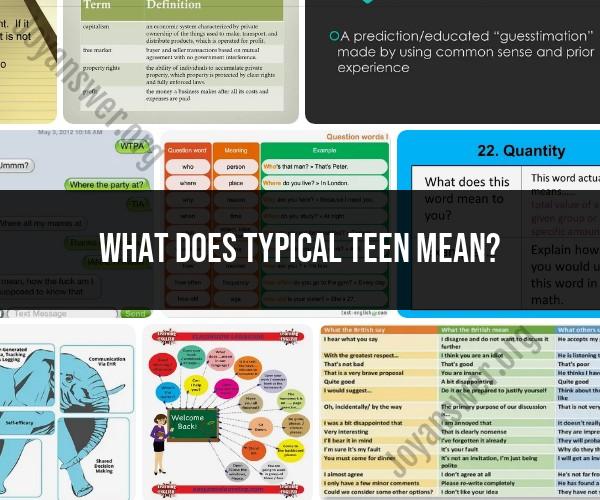What does typical teen mean?
The term "typical teen" generally refers to the behaviors, characteristics, and experiences that are commonly associated with teenagers, particularly within a specific cultural or societal context. However, it's important to note that there is no single definition of a "typical teen" because adolescence is a diverse and multifaceted stage of life, and teenagers vary widely in their thoughts, behaviors, and experiences.
Here are some key aspects often associated with the idea of a "typical teen":
Identity Formation: Typical teenagers are in the process of developing their own identities separate from their parents and caregivers. They may be exploring their values, beliefs, interests, and sense of self.
Peer Relationships: Adolescents typically place a significant emphasis on their peer relationships. They seek acceptance and approval from their friends, and peer dynamics play a central role in their lives.
Independence and Autonomy: Teenagers often desire more independence and autonomy. They may want to make decisions for themselves, take on responsibilities, and assert their individuality.
Emotional Changes: Hormonal changes during puberty can lead to emotional ups and downs. Mood swings, heightened sensitivity, and increased emotional intensity are common experiences for many teenagers.
Risk-Taking and Exploration: Adolescents are known for taking risks and exploring new experiences. This can include experimenting with different activities, trying new things, and occasionally engaging in risky behaviors.
Communication Styles: Typical teens may have unique communication styles, including the use of slang, texting, and social media. They often communicate with their peers differently than with adults.
Challenges in School: Many teenagers face academic challenges and stress related to schoolwork. Balancing academic responsibilities with extracurricular activities and social life can be demanding.
Identity Expression: Adolescents often express themselves through fashion, music, art, and other creative outlets. These forms of self-expression are a way to assert their individuality.
Interest in Technology: Teens are typically heavy users of technology, including smartphones and social media platforms. Technology plays a significant role in their social interactions and entertainment.
Relationships with Adults: While seeking independence, teenagers still rely on guidance and support from trusted adults, including parents, teachers, and mentors.
It's crucial to remember that there is a wide range of individual differences among teenagers. What may be typical for one teen may not be the same for another. Additionally, cultural, familial, and environmental factors can greatly influence the experiences and behaviors of adolescents. As such, the concept of a "typical teen" is a generalization and should be understood as a broad characterization rather than a rigid definition. Adolescents are unique individuals with their own personalities, experiences, and trajectories of development.
Defining "Typical Teen": Exploring the Concept
The term "typical teen" is often used to describe the average or most common teenage behaviors and experiences. However, it is important to note that there is no such thing as a truly typical teen. Every teenager is an individual with their own unique personality, experiences, and challenges.
That being said, there are some common themes that emerge when examining teenage behavior. For example, teenagers are often going through a period of rapid physical and emotional development. This can lead to a range of changes, including mood swings, increased risk-taking behavior, and a greater need for independence.
Teenagers also tend to be more focused on their peers than they were as children. They may spend more time with their friends and less time with their families. They may also be more influenced by peer pressure.
It is important to remember that teenage behavior is a spectrum. Some teenagers may exhibit more typical teenage behaviors than others. And some teenagers may experience behavioral problems that go beyond what is considered normal.
Typical Teenagers: Analyzing the Term and Its Meaning
The term "typical teenager" is often used in a variety of ways. It can be used to describe the average teenage experience, or it can be used to describe a specific type of teenager, such as a rebellious teenager or a popular teenager.
In some cases, the term "typical teenager" can be used in a negative way. For example, someone might say that a teenager is behaving like a "typical teenager" if they are being rude or disrespectful.
However, it is important to remember that all teenagers are individuals. There is no such thing as a truly typical teenager. Every teenager has their own unique personality, experiences, and challenges.
Teenagers and Normalcy: The Notion of "Typical Teens"
The notion of "typical teens" is often problematic. It can lead to expectations that are unrealistic and unfair. It can also stigmatize teenagers who do not conform to these expectations.
It is important to remember that there is no such thing as a truly typical teenager. Every teenager is an individual. We should celebrate diversity and individuality, rather than trying to fit teenagers into a narrow definition of what is considered normal.
Instead of focusing on what is typical, we should focus on supporting teenagers to be the best versions of themselves. We should create a safe and supportive environment where teenagers can explore their identities and develop their own unique talents and interests.













